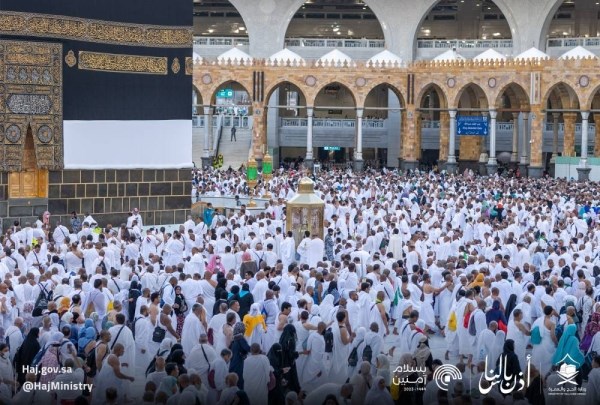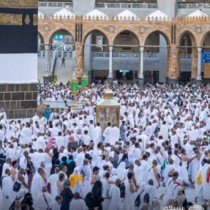
Hajj 2023 is first full-capacity pilgrimage post-pandemic

Tuesday June 27, 2023

The annual Hajj pilgrimage provides a unique model for crowd management.
MAKKAH — The Hajj of 2023 features a landmark full-capacity pilgrimage after a daunting three-year period when the COVID-19 pandemic sharply reduced the scale of the annual pilgrimage, one of the five pillars of Islam. More than two million pilgrims from 160 countries around the world will converge on Islam’s holiest mosque in Makkah this week to begin their lifetime spiritual journey at the holy sites in and around the holy city.
Officials from several Islamic countries have confirmed the restoration of their Hajj quota this year to the same level as it was before the outbreak of the coronavirus pandemic. Accordingly, the number of pilgrims from abroad for this year’s Hajj will cross two million from 57 Islamic countries and more than 100 other countries with Muslim populations in all corners of the world.
Deputy Minister of Hajj and Umrah Dr. Abdel-Fattah Mashat said the ministry is following the same mechanism that was in force before the outbreak of the coronavirus pandemic, in determining the quota of pilgrims from each country. He stressed that the current season is unique, and all services are ready in place at the holy sites.
Mashat said there are precautionary plans on the part of the concerned authorities to deal with any health or organizational emergency that may arise during the pilgrimage, and this comes within the Saudi capabilities in managing crowds and dealing with crises.He revealed that the concerned authorities in the Kingdom have received applications from many countries to join the Makkah Road initiative, and these applications are under study by the Ministry of Interior.
Regarding the classification of the Hajj service-providing companies and establishments, the deputy minister said these companies will be reclassified after Hajj based on the satisfaction level of the pilgrims in accordance with data from relevant evaluation forms that were posted on a major pilgrims’ platform. "A number of leading hospitality companies were provided with the opportunity to present their competitive services. The defaulting companies will be held accountable, and there are mechanisms to compensate the pilgrims for any shortcomings they are exposed to,” he said.
Mashat said this year’s Hajj season is unique. All the preparations are well in place beforehand for all services, and there have been integration, coordination and harmony among all parties participating in the Hajj operation, he said, adding that there is joint work between the Ministry of Hajj and Umrah and all the competent authorities. There is also cooperation in developing a coordinated operational plan for all, conducted through the Business Follow-up Office while the Central Hajj Committee does continuous follow-up of all works that take place at the operational level.
He said this is an important aspect of the organization process, which is in line with the general strategy of the Ministry of Hajj and Umrah with regard to early preparation for all services. This reflects in more than one service available to the guests of God. It is beneficial to both foreign and domestic pilgrims when all packages are offered through the local platform. The pilgrims from Europe, America, Australia and Canada were already the beneficiaries of the platform.
Mashat said the most important feature of this year’s Hajj is the total restoration of the pilgrims’ quota to pre-pandemic levels. He noted that the numbers will be the same that were approved before the pandemic. Similar is the case with the mechanism that the ministry followed in deciding the quota of pilgrims for each country.
According to the figures revealed by the General Authority for Statistics, the number of pilgrims who performed Hajj in 1440 exceeded 2.4 million. At the same time, the number of domestic pilgrims was estimated at about 634,000 male and female pilgrims, including 211,000 Saudis and 423,000 expatriates.
Mashat said this year witnessed the beginning of preparations well in advance to make available all the necessary facilities and services at the holy sites and that is in cooperation with the Kidana Development Company, which is assigned to supply various services at the holy sites and the Saudi Electricity Company and the National Water Company. Moreover, several new companies have also been tasked to provide the services, apart from those old companies, which are pioneers in the hospitality and service sectors that continued to provide the services in the past. This is a good aspect that reflects the competition between these companies to provide the best services to the pilgrims.
Regarding the Makkah Road initiative and its importance, Mashat said: "We have received many requests from several countries to join the initiative, and the specialized committee, headed by the Ministry of Interior, is carrying out a thorough study of all these requests in a professional way.”
Mashat stressed that the Makkah Road initiative is a very successful Saudi national experiment that gave a great positive impression on the guests of God, who are beneficiaries of this initiative. This year this service was provided for the first time in Turkey. The services that are provided through the Makkah Road are great, and the most important of them is the acceleration of the pilgrims’ arrival, and the completion of all arrival procedures before their entry to Saudi Arabia, making their entry very fast, and their baggage is being taken directly to their accommodation.
The Ministry of Hajj and Umrah has allocated a team for oversight and follow-up, Mashat said while noting that this year an electronic platform specialized in oversight and follow-up was used for all services.
More than 65 forms were used to measure service standards being provided to all pilgrims, and they are being followed up on strategic, operational, and supervisory levels. These three levels are being followed up on a daily and weekly basis and submitted to the competent committees to monitor and follow up on these services, evaluate them, and correct them in the possible ways according to the nature of the services provided. He said the follow-up teams are present in Makkah, Madinah and the holy sites.
The deputy minister stressed that Saudi Arabia, through its accumulated experiences over the decades, has developed ideal models for crowd management, and is able to deal with any situation. This model cannot be repeated anywhere in the world due to the circumstances of time and place and the large numbers of pilgrims who flock to Saudi Arabia through various entry ports within a matter of days.
There is no similar model in crowd management that moves an entire city five times — between Makkah, Madinah and the holy sites — and this accumulated experience of managing crowds cannot be found elsewhere in the world, the minister added.



 0
0 






Hajj 2023 is first full-capacity pilgrimage post-pandemic
..